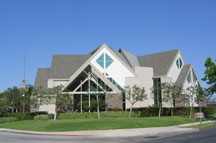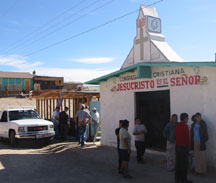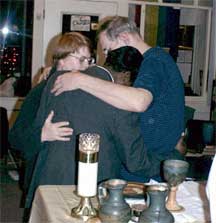| |
Church . . . What Really
Matters?
by Rev. Dr. Mark D. Roberts
Copyright © 2004 by Mark D. Roberts
Note: You may download
this resource at no cost, for personal use or for use
in a Christian ministry, as long as you are not publishing
it for sale. All I ask is that you give credit where
credit is due. For all other uses, please contact me
at mark@markdroberts.com
. Thank you.
Church
Identity and Church Distinctiveness
Part 1 in the series “Church . . . What Really
Matters?”
Posted on Wednesday, July 21, 2004
Today I’m beginning a new series that delves into the
question of what really matters about the church. Though my
conclusions will seem obvious to some, to others they will
appear almost heretical. But I believe that all Christians,
including but not only church leaders, need to take a fresh
look at the church, asking the question: What really
matters?
I was motivated to write on this subject by three recent
conversations. The first conversation was with the senior
pastor of a giant, thriving, vibrant, and relatively new church
in my area. This pastor, I’ll call him “Bret,”
has realized that it’s time for his church to define
more precisely who they are and what should be their mission.
Wisely, Bret has seen that being “hot” and “happening”
isn’t substantial and, at any rate, doesn’t last.
He wants to get to the core of what it means to be a church,
and what it means to be the unique church that God has called
him and his congregation to be. (What an encouraging example
of wise pastoral leadership! I can see why this church is
already so strong and healthy.)
| My second conversation was with
a member of my own church, someone I’ll call “Jim.”
The context of this discussion was our plan to start a
new band-led worship service on Sunday mornings, one that
is meant to connect with teenagers and Gen-Xers, many
of whom don’t relate naturally to our current form
of Sunday morning worship (so-called “blended,”
with a strong choir as well as praise music, etc.). Jim
was asking if adding this new service was consistent with
our church’s mission and identity. In his view,
what makes Irvine Presbyterian Church distinctive is our
unusual commitment to the creative use of traditional
and classical music, as well as other kinds of classic
liturgy. Indeed, this does set us apart from most of the
“happening” churches in our area, and even
some that aren’t “happening” at all. |
|
| |
The
sanctuary of Irvine Presbyterian Church: Does worship
with a rock band fit in a church that looks like this?
|
Our distinctiveness is bearing fruit in many ways, drawing
people who value great hymns and choral music, and even lots
of classical musicians who graciously share their talents
with us in worship. So Jim made a good point in asking us
not to forget the distinguishing marks of our church and our
particular identity. After all, we can’t be everything
to everybody. But, I wonder, should our distinctiveness as
a church that connects with a certain kind of people be so
central to our identity, or do we need to be more expansive
in our vision and mission?
My third conversation was with a internationally-known church
leader who is just about to plant a new church – something
he has not done before. This man, I’ll call “Levi,”
was sharing with me his vision for this new church. He and
his partners aren’t even sure what exactly their corporate
life will look like, how they will worship, or where they
will meet. But, above all, they want to be an authentic church,
faithful to God and to God’s vision of the church revealed
in Scripture.
As my conversation with Levi progressed, I was surprised
that I didn’t hear more about what might make this church
distinctive, because that seems to be the main thing in so
much conversation about the church today. Again and again
I hear “cutting edge” Christian pastors say: “I
don’t want our church to be like other churches. Rather,
I want us to be on the edge. We need to be unique. We want
to be different. We don’t want to be like the church
on the next block. And we certainly don’t want
to do church in the ways of the past.” Sometimes it
seems that the main rationale for being a church is almost
completely tied up in a church’s distinctiveness. If
a particular church isn’t distinctive, we might conclude,
then it has no good reason to exist.
These three conversations got me thinking about the whole
question of church identity and church distinctiveness. Is
it important for a church to define what makes it different
from other churches? If so, how important is it? How much
difference should distinctiveness make? Is this really what
matters in churches, or is distinctiveness more of a distraction
from what really matters? Maybe even an idol?
I’ll pick up this conversation in my next post.
Home
Exposing
the Idol of Distinctiveness
Part 2 in the series “Church . . . What Really
Matters?”
Posted on Thursday, July 22, 2004
In my last post I described three conversations that led
me to think about what really matters about the church. In
many conversations about church these days, there’s
a decided concern for distinctiveness. Many pastors think,
not only that individual churches must be distinctive, but
also that this distinctiveness is essential to their identity.
But I wonder . . . .
I don’t think my church, or any church for that matter,
should be just like another church. In fact, given the uniqueness
of each individual human being, and the fact that churches
are made up of such unique human beings, it’s impossible
for a church to be exactly like another. There will always
be differences among churches, even churches that are quite
similar in form and theology.
Furthermore, I do think it’s a good thing for churches
to have distinct personalities, worship-styles, emphases,
and so on. This allows the overall mission of Christ’s
church to reach a broader spectrum of people in the world.
Moreover, it reflects the unique way God calls and shapes
particular churches. My church, for example, is very different
in many ways from Bret’s church (see the
first post in this series), a young, predominantly Gen-X
church with an outstanding and, dare I say it, outstandingly
loud worship band. (There, I’ve just dated myself as
an aging boomer.) I’m thrilled about what God is doing
in Bret’s church, but I don’t think my own congregation
is meant to be like it in the details, or vice versa. (By
the way, for the record, I don’t think Bret would ever
call his church “Bret’s church.” In fact
this label probably horrifies him. But I want to keep his
identity confidential. Hence my odd way of describing this
church.)
Having said that churches will be distinctive and that this
is a good thing, I want to reverse ground and rail against
what I call “the idol of distinctiveness.” As
I listen to lots of conversations about church, it seems to
me that distinctiveness has taken on too much significance
among many church leaders. It’s as if being new, being
edgy, and, most of all, being different from other churches
has become the main thing. But I happen to believe that these
are so far from the main thing that prizing them too highly
can become a form of idolatry.
Often it’s also leads to pride. I’ve listened
to leaders from edgy churches talk as if they have finally
invented God’s perfect church. Hubris, indeed! (Okay,
a moment of confession. My own church used to be filled with
this sort of pride. When I got to Irvine Presbyterian Church
thirteen years ago, some of my members actually thought we
were, literally, the best Presbyterian church in the country,
if not the best church, period. Yikes! I know of at least
one other church that’s as good a we are. Well, maybe
two . . . .)
I want to propose a contrarian thesis that will sound like
heresy in some Christian circles, but here it is: In all
of the things that matter most, every church should be like
what every other church is trying to be. Let me say that
again, in case you missed it or didn’t believe it: In
all of the ways that really matter, every Christian church
should seek to be basically the same. Distinctiveness,
however inevitable and beneficial, is not part of what really
matters to a church. When being different gets too much attention,
this is a mistake. And when a church begins to prize its distinctiveness,
or even to think of itself as better than other churches because
of its distinctiveness, this can be a form of idolatry. It
also can keep a church from finding its true divine calling
and identity. The key to becoming a truly godly and healthy
church, I believe, is focusing on what really matters
in church, and what really matters is constant across churches,
denominations, cultures, and continents.
 |
On
the left, St. Basil's Cathedral in Moscow. On the right,
a small church in the community of El Niño, outside
of Tijuana, Mexico. Am I really saying that both of
these churches should strive to be essentially the same? |
|
If you want to be a true Christian church, don’t be
preoccupied with what makes you different from all the other
churches. Instead, strive to be what God’s Word says
the church is supposed to be. If you don’t know where
to start, you might begin with some of the Paul’s letters,
since they often speak directly to the question of the church’s
identity. Read 1 Thessalonians, or Philippians, or 1 Corinthians,
or Ephesians. Ask yourself: What does this book reveal about
the nature of the church? How does this book help my church
to understand who we are in Christ and what our mission is?
If you keep your focus here, and if the leaders of the church
up the street keep their focus here, and if the leaders of
the churches across the world keep their focus here, then
all of our churches will grow to be what God has called us
to be. Yes, we’ll differ in the details. But we’ll
be much the same in what matters the most.
I’ll continue this conversation in my next post in
this series, as I look for biblical support for my thesis
about church distinctiveness.
Home
Don't
Mistake the Wine for the Wineskins!
Part 3 in the series “Church . . . What Really
Matters?”
Posted on Sunday, July 25, 2004
In my last post I proposed a thesis which, I admitted, would
sound like heresy in many Christian circles. In case you missed
it, here it is again: In all of the things that matter
most, every church should be like what every other church
is trying to be. Or to put it another way: In all
of the ways that really matter, every Christian church should
seek to be basically the same.
Okay, now that I’ve laid out my heresy, I’d better
defend it from Scripture. I’d like to begin by pointing
to a biblical text that doesn’t address directly the
nature of the church, but nevertheless provides a useful analogy.
The passage comes from the Gospel of Mark, where Jesus speaks
about wineskins:
 |
“No one sews a piece of unshrunk cloth on an
old cloak; otherwise, the patch pulls away from it,
the new from the old, and a worse tear is made. And
no one puts new wine into old wineskins; otherwise,
the wine will burst the skins, and the wine is lost,
and so are the skins; but one puts new wine into fresh
wineskins.” (Mark 2:21-22)
In its original context in Mark, this text claimed
that the “new wine” of the kingdom of God
– the core of Jesus’s ministry and message
– wouldn’t fit within the “old wineskins”
of Jewish ceremonial law (fasting, legalistic Sabbath-keeping).
|
| It isn’t too much of a
stretch, I think, to say that the new wine of the gospel
of Jesus Christ can’t be confined within the wineskins
of religious forms and traditions. As the good news comes
to life in a new century or a new community, new forms
and practices inevitably develop. Preach the gospel in
Latin America, for example, and before long there will
be songs of praise in Spanish sung by worshippers who
are, for the most part, way more expressive than those
of us who hail from Northern Europe. When missionaries
try to force new converts from other cultures to adopt
the traditional forms from the missionaries’ own
culture, these wineskins inevitably burst. |
|
| |
A
praise service from a church in Peru.
|
But even new wineskins are still just wineskins. They’re
not the new wine. New ways to evangelize, new forms of worship,
new language for church – all of these are necessary
and potentially even good, but they should not be confused
with new wine. In time, all new wineskins become old. This
is something that younger church leaders, full of vim and
vision, often overlook. I know I once did!
Please understand me. I’m not saying wineskins are
bad or to be avoided. Hardly! Wine has to come in some container,
whether it be a leather skin, a bottle, or, as in 21st century
America, a cardboard box. Wineskins are just fine, even necessary,
but they’re not the wine.
The forms in which a particular church contains the gospel
will be distinctive, and, in a healthy church, never too rigid.
But that which matters most, the wine inside the skins, should
be essentially the same from church to church. For example,
though I might preach the gospel in a different mode than
the Gen-X pastor down the street, our fundamental message
– the good news of what God has done in Jesus Christ
– had better be, not just similar, but precisely the
same. And, no matter how much we pastors might be tempted
to focus on the mode of communication, what really matters
is the substance of the gospel.
I believe that what makes a church distinctive is always
be a matter of wineskins, not wine. What makes a church Christian,
what makes a church a church – now this is a matter
of wine. All genuine churches should be filled with the same
wine, the good news of the gospel and its implications. If
ever we’re tempted to change wines, then we fall into
real heresy. Let’s not forget Paul’s stern warning
to the Galatians:
I am astonished that you are so quickly deserting the one
who called you in the grace of Christ and are turning to
a different gospel -- not that there is another gospel,
but there are some who are confusing you and want to pervert
the gospel of Christ. But even if we or an angel from heaven
should proclaim to you a gospel contrary to what we proclaimed
to you, let that one be accursed! As we have said before,
so now I repeat, if anyone proclaims to you a gospel contrary
to what you received, let that one be accursed! (Gal 1:6-9).
It’s a fine thing to look for new ways to communicate
the gospel in a different cultural setting. But it’s
not a fine thing at all to change the basic gospel to fit
the whims of that culture.
So far I’ve been talking about the wine of gospel,
the enduring message of what God did in Jesus Christ. I’ve
said that this same gospel should be at the core of every
church. But is there more that should remain constant? To
put it differently, is wine more than just the gospel message?
To this question I’ll return in my next post.
Home
Is "Wine" More Than the Gospel Message?
Part 4 in the series “Church . . . What Really Matters?”
Posted on Monday, July 26, 2004
So far I’ve argued that every church should share,
at its core, exactly the same “wine” – the
gospel of God’s work in Jesus Christ. But is this all
that every church should share? Is everything else a matter
of wineskins? Or are there other elements of church life that
are so essential as to be considered part of the wine?
My friend Levi, the one I mentioned in Part
1 of this series who is helping to plant a new church
in his community, works within the support and constraint
of a well-established denomination. Before he and his colleagues
could start a church, they needed the endorsement of the local
denominational official. This person also had a great deal
of authority over the specifics, those things that would make
this particular church distinctive, at least at the beginning.
But in his charge to Levi & Co., he said the following:
“I’m not particularly concerned about exactly
how you meet or how you worship or what the church looks like.
Just do the things in Acts 2 and all will be well.”
What sage and godly direction! Way to go, nameless church
official from a highly institutional denomination!
I’m going to take the lead from this denominational
official and flesh out in some detail “the things in
Acts 2.” Indeed, these elements of church life are so
closely connected to the gospel that they should be thought
of more as wine than as wineskins. In other words, wherever
the gospel of Christ is received in faith and translated into
daily living, the things we see in Acts 2 will necessarily
be present. And if one is inclined to quibble, it would be
easy to show from the rest of Scripture that the practices
of the church in Acts 2 are, indeed, essential to any healthy
Christian community. By the end of this series I’m quite
sure you’ll agree.
If you haven’t read Acts 2 in a while, let me remind
you of the context. The Holy Spirit was poured out on the
earliest Christians. Peter preached his first sermon and about
three thousand new believers in Jesus gathered to form the
first church. So what did they do next? Here is the summary
in Acts 2: 42-47:
They devoted themselves to the apostles’ teaching
and fellowship, to the breaking of bread and the prayers.
Awe came upon everyone, because many wonders and signs were
being done by the apostles. All who believed were together
and had all things in common; they would sell their possessions
and goods and distribute the proceeds to all, as any had
need. Day by day, as they spent much time together in the
temple, they broke bread at home and ate their food with
glad and generous hearts, praising God and having the goodwill
of all the people. And day by day the Lord added to their
number those who were being saved.
Although this passage is not a didactic treatise on the nature
of the church, it certainly touches upon most of the things
that matter most in any church. In this post and in those
to follow, I want to highlight these essential components
as they are found in the text of Acts 2.
Authoritative Teaching
The earliest believers “devoted themselves to the apostles’
teaching.” Notice, they didn’t merely listen to
it or tolerate it. In fact the verb “devoted themselves”
suggests a more passionate and energetic commitment. These
people really wanted to learn! And so should we. Every single
Christian church should have, at the core of its corporate
life, a commitment to the teaching and learning of God’s
truth.
Of course we don’t
have the original apostles around to teach us. But we
have the writings they endorsed as God’s Word
(the Old Testament) and the ones they or their followers
wrote, which were approved by the churches they founded
(the New Testament). So when we devote ourselves to
Bible study, we’re acting like the church in Acts.
Needless to say, the modes of Bible study will vary
in different churches (lecture, discussion, small groups,
study guides, video, expository preaching, blog, e-mail,
etc.). But every Christian church should strive to make
the study of “the apostles’ teaching”
a central element of corporate life. Leaders should
focus, not on how they can teach distinctively, but
on how they can faithfully convey God’s truth
in the place where God has put them. This will lead
to distinctiveness, of course, but not to making an
idol out of being distinctive. |
|
| |
A
Bible study for inner-city kids at Grand Valley Christian
Camp outside of Cleveland, OH.
|
Increasingly these days I hear some Christians speak negatively
about teaching. Identifying someone as a teacher supposes
this person has a certain measure of authority, perhaps even
“privileged” interpretations of Scripture. This
sort of model doesn’t fit well in a postmodern culture
where all opinions are equal. So some churches, buying into
the postmodern ethos, have abandoned biblical teaching in
favor of group discussion and the sharing of feelings. (Ironically,
this is much like the “values-clarification” approach
to learning that impoverished my teenage years in church.)
I’m all in favor of small group discussion. And I’m
well aware that others might have insights into biblical truth
that I have overlooked. Just because I have a Ph.D. in New
Testament and am called "Pastor" does not mean I
have all the answers, believe me. But the authentic church
will always be based upon “the apostles’ teaching,”
and at times this means certain teachers – trained,
gifted, and authorized – will be charged with the task
of rightly teaching God’s Word. Of course, in the power
of the Spirit, we can all “teach and admonish one another”
(Col 3:16). So no person is ever left out of the teaching
loop, even if some are called to special ministries of teaching.
Home
Fellowship
Part 5 in the series “Church . . . What Really Matters?”
Posted on Tuesday, July 27, 2004
In my last post I began to spell out in detail some of the
elements of the church’s “wine” –
the essentials that should matter most in any church. Using
Acts 2:42-47 as a paradigm, I proposed that every church should
be centered in the teaching of God’s truth. Today we
come to the next element in the list: fellowship.
The first Christians devoted themselves, not only to teaching,
but also to “fellowship” (Acts 2:42). They seemed
to understand intuitively that the Christian life was necessarily
a shared endeavor. So they gathered together with other believers
right from the start.
For years I’ve been
concerned about the pervasive tendency towards individualism
in much of the church in North American and Western
Europe. Unlike the first Christians, we seem to think
that “fellowship” is optional equipment
rather than required component of true Christian living.
My concern about our rampant individualism led me to
write a whole book that shows how essential fellowship
is to Christianity. That’s the main thesis of
After
“I Believe.” I believe it’s
as valid and needed today as it was four years ago when
I wrote the book.
Of course we must understand that “fellowship”
in biblical perspective is far more than donuts and
coffee after church. As I showed in After “I
Believe,” the New Testament notion of “fellowship”
(Greek, koinonia) is intimate, committed relationship
and partnership. It’s closer to what you’d
experience in a healthy family than in the typical church
“fellowship hall.” Genuine Christian fellowship
is an expression of mutual love, the love of God in
Jesus Christ, the love that forms the center of the
gospel. |
|
Fellowship among God’s people is essential, therefore,
because it’s part and parcel of the gospel. As we see
in Acts 2, when the gospel is preached and rightly received,
fellowship necessarily comes into being. Moreover, the fellowship
created by the gospel also becomes the chief vehicle for the
gospel’s proclamation in the world (see Acts 2:47 and
1 Thes 1, for example).
So a church without intentional, dedicated Christian fellowship
is not a real church. Yes, of course the forms of fellowship
will differ widely among churches. But the “new wine”
of fellowship must always be present. Once again, let me say
that Christian leaders should worry less about whether their
forms of fellowship are unique, and more about whether the
people in their church are truly sharing their lives together
in Christ. Is there genuine mutual love and commitment? Are
people helping each other to grow in faith? Are they putting
up with and forgiving each other? Yes, new needs and technologies
make new forms of fellowship possible. (I’m impressed,
for example, at how much instant messaging is used among the
junior highers in my church, and how much cell phones are
used among the high schoolers, and now much e-mail is the
communication mode among collegians.) But, in the end, true
Christian fellowship will look more or less has it has for
centuries. It will look like people, people interacting with
people, caring for each other, praying together, studying
together, playing together, worshipping together, serving
together in the world.
I could go on and on, but I won’t. If you’re
interested, you can always buy
the book!) How’s that for shameless self-promotion?
Home
Breaking
Bread
Part 6 in the series “Church . . . What Really
Matters?”
Posted on Wednesday, July 28, 2004
Using Acts 2 as a paradigm, we’ve seen that biblical
teaching and fellowship are among the elements that really
matter in church. Today we’ll continue our study of
Acts 2 as we move on to the next crucial component of church:
breaking bread.
The first Christians also devoted themselves to “the
breaking of bread” (Acts 2:42). Biblical commentators
debate the precise meaning of this phrase. Clearly it means
“eating together.” In first-century Judea “breaking
of bread” was an inevitable part of each meal. But some
interpreters have seen in “breaking of bread”
a pointer to Communion, the celebration of the Lord’s
Supper among the first Christians.
I don’t think one can prove that “breaking of
bread” in Acts 2:42 necessarily means “having
Communion.” Most obviously it means “sharing meals
together.” We see this clearly in verse 46: “they
broke bread together at home and ate their food with glad
and generous hearts.” Yet, though we don’t have
lots of evidence for early Christian ways of celebrating Communion,
it’s highly likely that this happened in the context
of an ordinary meal (see 1 Cor 11:17-34). So, “breaking
of bread” in Acts 2, though pointing primarily to shared
meals, may also suggest the intentional remembering of Jesus’
death in the mode begun by our Lord himself at the Last Supper.
Is the breaking of bread essential to the church? Let me
“break” this apart into two questions. 1) Must
Christians share food together? 2) Must Christians share Communion
together? I’ll tackle the second first.
Yes, Christians must share Communion together, because Jesus
said so. That clinches the argument. But church history also
bears witness to this basic fact. Though Christians celebrate
Communion in different forms and with varying theologies,
they always do it (with very few exceptions).
| In recent years cutting-edge churches have
found some new ways to experience Communion. Putting off
older wineskins of tradition, like the passing of bread
and wine along pews in silver trays, these churches have
made new wineskins which, in many cases, have led people
to a fresh and deeper experience of God’s grace
in Christ. But, in some cases, churches have inadvertently
celebrated Communion in ways contrary to its essential
meaning. I’m especially concerned about the individualistic
practices in some churches, whereby people serve themselves
privately, communing with the Lord as if completely alone.
Stripping away the community from Communion is exactly
the problem Paul tried to solve in 1 Corinthians 11:17-34.
Individualistic communion illustrates one potential problem
in the search for differentness: it can lead a church
away from the core truth of the gospel. (At some point
in the future I’ll say more about this whole issue
of individualistic communion.) |
|
| |
A picture is
worth a 1000 words. Here's a brilliant example of what
Christian communion is really all about.
|
Question 1) was: Must Christians share food together? I’m
almost tempted to say “yes.” I’ve been in
many, many different churches over the years, and every single
one eats together. Moreover, though we don’t follow
the Old Testament ceremonial law, it’s not an accident
that God instructed his people to eat together in many different
ways when they gather together in his name. The point isn’t
just getting nutrition, but the deeper meaning of shared food.
Even in Western culture, but so much more in Middle Eastern
culture, sharing a meal is a way of sharing life. It’s
a context for intimacy, celebration, laughter, and discussion.
A church that never ate together would be missing out on so
much that makes church wonderful and meaningful . . . not
to mention just plain fun!
 |
One
of my favorite pictures of my church, enjoying a potluck
supper together. |
So, though I don’t think we can put sharing a meal
together in the same category as sharing Communion together,
I’d argue that any church would be well-advised to make
shared meals a central part of its corporate life. Naturally
there will be great differences, both in the way food is produced
(potluck, pizza delivery, catering, church cook, etc.) and
in the kinds of food consumed. I’ve had great BBQ in
a Lutheran Church in Wisconsin, spicy kimchee in a Korean
church in California, and endless amounts of chicken casserole
in my own Presbyterian churches. More importantly, in all
of these contexts I’ve enjoyed face to face interaction
with my sisters and brothers in Christ as we share, not just
food, but life together.
Eating with other believers also reminds us that the Christian
life isn’t merely some mystical and transcendent experience,
though it certainly might be. God created the world good, and
invited us to enjoy it. And when the world needed saving, God
didn’t stand back from a distance and fix everything,
but he became a part of the world in Jesus, the Word Incarnate.
This Jesus, God in the flesh, not only ate food, often in fellowship
with others, but he sometimes created food so that people wouldn’t
be hungry. When we eat together we remember that God wants to
be part of our day to day lives, our everyday relationships.
Home
Prayer
Part 7 in the series “Church . . . What Really
Matters?”
Posted on Friday, July 30, 2004
So far, by using the model of Acts 2, I have identified the
follow core components of church: teaching, fellowship, and
breaking bread. Today we come to the next component: prayer.
In Acts 2:42, the earliest Christians “devoted themselves
to the apostles’ teaching and fellowship, to the breaking
of bread, and the prayers.” Prayer always lies
at the heart of Christian discipleship and community. Jesus
both invited and commanded us to pray, and so we have as Christians,
right from the start of the church.
Once again, commentators differ on exactly which prayers
are meant in this verse. In all likelihood they include the
official Jewish prayers offered in the temple (see Acts 3:10)
as well as the prayers of the Christian community (see Acts
4:23-31). For those of us inclined to see the Christian life
through individualistic eyes, it’s worth noting that
the prayers of this text are surely corporate, even though
individual Christians would also have prayed privately.
| Wherever Christians gather, there you’ll
find prayer. The forms vary widely, but the heart of prayer
is shared among Christians of all denominations, ethnicities,
and other variations. Certain segments of Christians seem
to have particular strengths in prayer, for example: Koreans
with intensive intercession, Roman Catholics with silence,
and Eastern Orthodox with reflective meditation. Leaders
of particular churches would do well, not only to consider
which forms of prayer might be stressed in their own churches,
but also how they might learn from other communities and
traditions. |
|
As we grow in prayer, we realize that it is less about getting
God to do what we want, and more about being with God. I’m
not saying that we shouldn’t bring our needs before
the Lord. Jesus himself tells us to do this (Matt 7:7-11),
and promises that God will bless us in return. But, as wonderful
as answered prayers can be, nothing surpasses the delight
of being in God’s presence and sharing that presence
with your brothers and sisters in Christ.
It’s rather like another kind of “presents,”
if you’ll pardon the play on words. When I was young,
I loved Christmas. Yes, I was fascinated by the birth of Jesus.
And, yes, I loved it when my relatives would visit from out
of town. And I liked the music, and the food, and the lights.
But, most of all, I liked getting presents. Christmas, bottom
line, was about the bottom line: what I would get.
| But as I grew, my priorities began to change.
Now, though I’m perfectly happy to get presents,
I’d have a delightful Christmas without them. What
I love most of all in Christmas are the relationships.
I cherish just being with my wife and children on Christmas
morning, sharing in their joy and wonder. And, even though
I’m exhausted after doing three services on Christmas
Eve, including one at midnight, I love going to be with
my family on Christmas day. But, I can truly say that
the most special part of Christmas for me today is worship.
When I come before the baby Jesus, awed by God’s
presence in such a tiny, helpless child, I can’t
help but weep for wonder and thanks. I wouldn’t
trade all the presents in the world for the delight of
being with Jesus at Christmas. |
|
| |
Christmas afternoon
at my mother's house. Plenty of presents; and plenty
of "presence."
|
So it is with prayer. Don’t get me wrong. I still ask
the Lord for plenty of things in prayer, just like he told
me to do. But there are times when I my needs and desires
fade into the background, and I simply delight in the Lord.
Sometimes this happens when I’m alone in prayer. But
often it comes when I praying with fellow believers, either
in worship or in intercession. Prayer in church is rather
like being together as a family on Christmas morning, except
in God’s presence I’m not the father, but the
child delighting in God’s generous gifts.
Home
Signs and Wonders
Part 8 in the series: "Church . . . What Really
Matters?"
Posted on Saturday, July 31, 2004
What really matters in church? So far I’ve
been using Acts 2 as a paradigm. And so far what I’ve
come up with has been pretty uncontroversial. Most all Christians
would agree that church must comprise teaching, fellowship,
breaking of bread, and prayer. But now we come to a more debated
element. Should church today include signs and wonders? Or
were these manifestations of power reserved for the apostolic
age?
According to Acts 2:43, “Awe came upon everyone, because
many wonders and signs were being done by the apostles.”
Ah, now here’s something to divide the house. For much
of my early life, I was taught that signs and wonders were
supposed to be part of the early church experience, but not
a part of ours today. As this verse from Acts says, the miracles
were being done “by the apostles.” So the miracles
were for the apostolic age, not ours. Therefore it would be
a theological error to insist that signs and wonders are essential
to the church today. In fact, they shouldn’t even be
expected, or, in some cases, permitted.
I now believe that what I was taught in my youth was wrong,
for many reasons. I’ll mention three.
First, it’s a theological error to identify as signs
and wonders only physical miracles (like healing). When God
changes a heart, or heals a marriage, or calls a sinner to
repentance, these are every bit as much signs and wonders
as physical healings. Many churches that deny the presence
of signs and wonders today have lots of signs and wonder.
They just don’t call them that.
Second, I believe that if one reads the New Testament with
an open, discerning mind, it’s impossible to come to
the conclusion that signs and wonders were only for the apostolic
age. Yes, I know many Christians believe this, but I attribute
this to a biased reading of the Bible. (In fairness, I should
note at this point that many of the most passionate advocates
of the apostolic-age theory for signs and wonders come from
my own theological tradition, conservative Presbyterianism.)
Even if you bracket the church in Acts as something not to
be repeated throughout church history, you still have to contend
with the rest of the New Testament. If you consider Jesus’
example and teaching of the kingdom of God, combined with
the writings of Paul (especially 1 Corinthians 12-14), I believe
you’ll be persuaded that signs and wonders are an essential
part of the experience of the kingdom of God on earth, today
as in the apostolic age.
Third, it’s impossible
to deny the reality of miraculous signs in the church
today if you pay attention to what’s going on
around the world. Throughout the globe, especially but
only in the Southern Hemisphere, God’s power is
being poured out upon the church in the form of signs
and wonders, both the material and the immaterial kind.
(Curiously enough, I’ve known many Christians
over the years who claim that signs and wonders aren’t
for today. Yet most of these people have stories of
God doing amazing miracles, even physical healings and
the like. If you’re looking for a trustworthy
book on signs and wonders today, I’d recommend
When
the Spirit Comes With Power: Signs and Wonders Among
God’s People,
by John White.)
From a theological point of view, the reality of signs
and wonders has to do with the presence of God’s
kingdom in the world. Since this kingdom isn’t
yet fully present, God’s power isn’t yet
fully experienced. Hence we still experience sickness,
injury, depression, and death. At times our prayers
for healing, like all others prayers, receive a big
fat “no.” But since God’s kingdom
is already present, though not completely, we can and
do experience his power in many ways, including those
we associate with signs and wonders. |
|
| |
Kathryn
Kuhlman, one of the most illustrious Christian "healers" of the last century. A very sober Christian friend of
mine once attended one of Miss Kuhlman's meetings. Skeptical,
he sat far back from the stage. During the meeting he
was healed of a chronic back condition. |
Of course I am well aware of the hucksters and impostors,
purported Christians who make up miracles to hock their spiritual
wares. And I’m also familiar with the human tendency
to exaggerate. Yes, I have also seen cases where churches
get so wrapped up in the miraculous that they completely lose
balance, sometimes even orthodoxy. Nevertheless, the example
of the early church in Acts, combined with the theological
teachings of the New Testament, suggest that signs and wonders
of all kinds will be part and parcel of the Christian church.
Once more, I’d urge church leaders not to focus on
the distinctiveness of their church in the matter of signs
and wonders. The point is not to decide which miracles God
is welcome to do in any church and which are forbidden. Rather,
we’re to seek the Lord and his power, and to be open
to all gifts he wants to give us for his purposes (1 Cor 12-14,
esp. 12:4-11 and 14:1).
In my next post in this series, I’ll look at the issues
of generosity and justice. For now, the blog (really the blogger)
is going to take a couple days off.
Home
|















